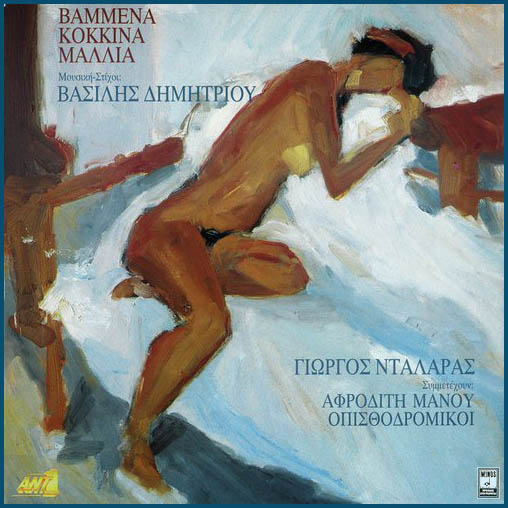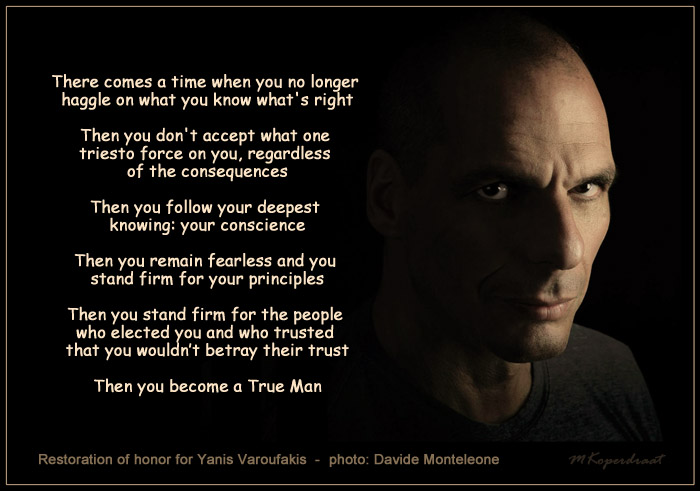The following (adapted) article was previously published in the magazine Lychnari, Explorations in Modern Greece.
It’s a textual interpretation of the famous Greek song ‘To Pepromèno’ (‘Destiny’).
The lyrics and music are by Vasilis Dimitríou, who passed away in 2015, and the song was written for the TV series Vammena Kokkina Mallia (from 1992: 37 episodes), based on a novel by Kostas Mourselás about the ups and downs of many characters across several generations. Sung by the famous singer Giorgos Dalaras.
Listen to the song here
If you ask me, ‘what do you consider the most beautiful Greek song?’ I can’t answer that. There’s so much beautiful Greek music. However, there are songs high on my list of favorites because they touch me, no matter how often I hear or play them. One such standout, set to the characteristic chasapiko rhythm, features lyrics of nearly biblical proportions: To Pepromeno (Το Πεπρωμένο – Destiny).
The Song
 The lyrics are profound and open to interpretation. Here are two interpretations that, for me, elevate the song. The song may have a different meaning within the context of the TV series, but like all art and poetry: personal interpretation adds value and other forms of appreciation are secondary. (For instance, Van Gogh’s sunflowers hold no value for me personally, no matter how beautiful someone else might find the painting or the historical or financial value attributed to it.)
The lyrics are profound and open to interpretation. Here are two interpretations that, for me, elevate the song. The song may have a different meaning within the context of the TV series, but like all art and poetry: personal interpretation adds value and other forms of appreciation are secondary. (For instance, Van Gogh’s sunflowers hold no value for me personally, no matter how beautiful someone else might find the painting or the historical or financial value attributed to it.)
Destiny
Do not neglect your destiny
and always keep an eye on the course of your life
because while you sleep, someone else is writing history
and gambles with your life
For all of us, it’s written
what is predetermined and unavoidable
For this, there’s no theory, no train, no ship
Everyone grapples with it to the best of their knowledge and ability
Even as a child, I dreamt of fires
We always give too little for love
and realize you won’t get anything in return
Give and go away, don’t miss an opportunity
Don’t neglect your soul (don’t pass by your soul)
In the World
At the request of EenVandaag, my orchestra Ano Kato played To Pepromèno in 2011 during a segment about the Greek crisis. “Why pay for a country that messes things up?” was the introduction by Pieter Jan Hagens. I chose this song to counterbalance the half-baked (dis)information that was being spread in the media at the time.
Greece, in its eager quest for substantial loans and neglecting its destiny, handed its fate to the banks to enter the Eurozone and ‘slept’. The banking world, which subsequently caused the crisis itself, ‘wrote history’ with this move, gambling ‘Greece’s life’ (and that of other countries). Thus, it’s wise to ‘awake’ to promptly discern deception and abuse of power. The fate of the Greek population ‘was predetermined’, ‘couldn’t be avoided’, and they ‘grapple with it to the best of their knowledge and ability’. The entirety of Europe bore witness to this struggle for a long time. Even now, the least fortunate bear the brunt of political neglect of Greece’s fate.
‘We always give too little for love’, and this becomes very apparent in times of crisis. Assistance to Greece was essentially a bailout of Northern European banks, and the Troika’s rigid stance completely overlooked ‘every soul’. Anti-Greek sentiment was widespread in the Netherlands. ‘The pressure must be maximum’, our finance minister proclaimed, obliviously disregarding the impact on people. Neglecting one’s soul essentially leads to a lack of conscience. The elderly, youth, the poor, and the unemployed within the Greek population were given no consideration, leading to much suffering.
(bit.ly/trojka-beleid & bit.ly/imf-excuus)
Within Ourselves
In spiritual philosophy, ‘sleep’ refers to the mechanical life that the majority of humanity leads: a life filled with work, dreams, desires, gratifications, materialism, submission, and often following ideologies and addictions (The series Vammena Kokkina Mallia revolves around such people). Those ‘asleep’ are unable to transcend the mental and emotional mechanisms that obstruct inner transformation. For personal growth — to become a so-called ‘true’ human (realized), free from illusions, identifications, and ego manifestations — one must ‘wake up’ and ‘keep a close eye on the course of their life’. While our soul sleeps, ‘someone else’ writes history: That ‘other’, who writes history, represents what we essentially are not, but constantly believe we are: our self-image or ego, which expresses itself both individually and collectively, adhering to trends, surges, and political or religious -isms, and acts based on self-justification strategies. With this, we can truly ‘gamble with our lives’, as evidenced by (verbal) violence, suppression on a global scale, and all the casualties resulting from conflict, wars, and addictions.
 While we’re ‘asleep’, there can hardly be any giving (of unconditional love), so ‘we always give too little’. We’re often self-centered, focused on our immediate surroundings. Only when we understand that we won’t get anything in return, in terms of personal merit or reward, can we give and move on. By doing so, we no longer ‘neglect our soul’, which seeks connection and can love unconditionally, something the ego cannot do.
While we’re ‘asleep’, there can hardly be any giving (of unconditional love), so ‘we always give too little’. We’re often self-centered, focused on our immediate surroundings. Only when we understand that we won’t get anything in return, in terms of personal merit or reward, can we give and move on. By doing so, we no longer ‘neglect our soul’, which seeks connection and can love unconditionally, something the ego cannot do.
And then, it turns out that our soul does receive a lot in return because selfless giving is, on a deeper level, also receiving. It brings profound happiness.
Since ‘what is predetermined and cannot be avoided’, there’s no ‘theory’, no ‘train or ship’ as a ‘mode of transport’, that can circumvent our soul’s liberation, making everyone ‘grapple with it to the best of their knowledge and ability’. Life continually tests us!

